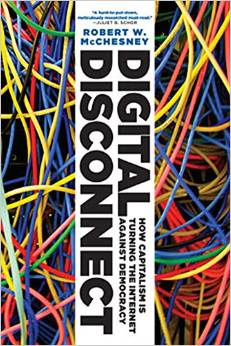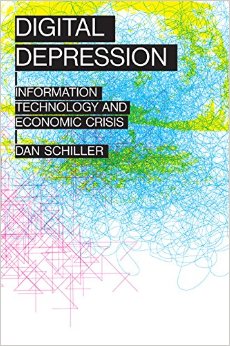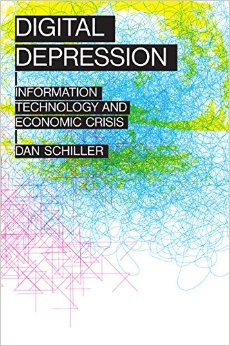 a review of Robert W. McChesney, Digital Disconnect: How Capitalism Is Turning the Internet Against Democracy (The New Press, 2014)
a review of Robert W. McChesney, Digital Disconnect: How Capitalism Is Turning the Internet Against Democracy (The New Press, 2014)
by Richard Hill
~
Many of us have noticed that much of the news we read is the same, no matter which newspaper or web site we consult: they all seem to be recycling the same agency feeds. To understand why this is happening, there are few better analyses than the one developed by media scholar Robert McChesney in his most recent book, Digital Disconnect. McChesney is a Professor in the Department of Communication at the University of Illinois at Urbana-Champaign, specializing in the history and political economy of communications. He is the author or co-author of more than 20 books, among the best-known of which are The Endless Crisis: How Monopoly-Finance Capital Produces Stagnation and Upheaval from the USA to China (with John Bellamy Foster, 2012), The Political Economy of Media: Enduring Issues, Emerging Dilemmas (2008), Communication Revolution: Critical Junctures and the Future of Media (2007), and Rich Media, Poor Democracy: Communication Politics in Dubious Times (1999), and is co-founder of Free Press.
Many see the internet as a powerful force for improvement of human rights, living conditions, the economy, rights of minorities, etc. And indeed, like many communications technologies, the internet has the potential to facilitate social improvements. But in reality the internet has recently been used to erode privacy and to increase the concentration of economic power, leading to increasing income inequalities.
One might have expected that democracies would have harnessed the internet to serve the interests of their citizens, as they largely did with other technologies such as roads, telegraphy, telephony, air transport, pharmaceuticals (even if they used these to serve only the interests of their own citizens and not the general interests of mankind).
But this does not appear to be the case with respect to the internet: it is used largely to serve the interests of a few very wealthy individuals, or certain geo-economic and geo-political interests. As McChesney puts the matter: “It is supremely ironic that the internet, the much-ballyhooed champion of increased consumer power and cutthroat competition, has become one of the greatest generators of monopoly in economic history” (131 in the print edition). This trend to use technology to favor special interests, not the general interest, is not unique to the internet. As Josep Ramoneda puts the matter: “We expected that governments would submit markets to democracy and it turns out that what they do is adapt democracy to markets, that is, empty it little by little.”
McChesney’s book explains why this is the case: despite its great promise and potential to increase democracy, various factors have turned the internet into a force that is actually destructive to democracy, and that favors special interests.
McChesney reminds us what democracy is, citing Aristotle (53): “Democracy [is] when the indigent, and not the men of property are the rulers. If liberty and equality … are chiefly to be found in democracy, they will be best attained when all persons alike share in the government to the utmost.”
He also cites US President Lincoln’s 1861 warning against despotism (55): “the effort to place capital on an equal footing with, if not above, labor in the structure of government.” According to McChesney, it was imperative for Lincoln that the wealthy not be permitted to have undue influence over the government.
Yet what we see today in the internet is concentrated wealth in the form of large private companies that exert increasing influence over public policy matters, going to so far as to call openly for governance systems in which they have equal decision-making rights with the elected representatives of the people. Current internet governance mechanisms are celebrated as paragons of success, whereas in fact they have not been successful in achieving the social promise of the internet. And it has even been said that such systems need not be democratic.
What sense does it make for the technology that was supposed to facilitate democracy to be governed in ways that are not democratic? It makes business sense, of course, in the sense of maximizing profits for shareholders.
McChesney explains how profit-maximization in the excessively laissez-faire regime that is commonly called neoliberalism has resulted in increasing concentration of power and wealth, social inequality and, worse, erosion of the press, leading to erosion of democracy. Nowhere is this more clearly seen than in the US, which is the focus of McChesney’s book. Not only has the internet eroded democracy in the US, it is used by the US to further its geo-political goals; and, adding insult to injury, it is promoted as a means of furthering democracy. Of course it could and should do so, but unfortunately it does not, as McChesney explains.
The book starts by noting the importance of the digital revolution and by summarizing the views of those who see it as an engine of good (the celebrants) versus those who point out its limitations and some of its negative effects (the skeptics). McChesney correctly notes that a proper analysis of the digital revolution must be grounded in political economy. Since the digital revolution is occurring in a capitalist system, it is necessarily conditioned by that system, and it necessarily influences that system.
A chapter is devoted to explaining how and why capitalism does not equal democracy: on the contrary, capitalism can well erode democracy, the contemporary United States being a good example. To dig deeper into the issues, McChesney approaches the internet from the perspective of the political economy of communication. He shows how the internet has profoundly disrupted traditional media, and how, contrary to the rhetoric, it has reduced competition and choice – because the economies of scale and network effects of the new technologies inevitably favor concentration, to the point of creating natural monopolies (who is number two after Facebook? Or Twitter?).
The book then documents how the initially non-commercial, publicly-subsidized internet was transformed into an eminently commercial, privately-owned capitalist institution, in the worst sense of “capitalist”: domination by large corporations, monopolistic markets, endless advertising, intense lobbying, and cronyism bordering on corruption.
Having explained what happened in general, McChesney focuses on what happened to journalism and the media in particular. As we all know, it has been a disaster: nobody has yet found a viable business model for respectable online journalism. As McChesney correctly notes, vibrant journalism is a pre-condition for democracy: how can people make informed choices if they do not have access to valid information? The internet was supposed to broaden our sources of information. Sadly, it has not, for the reasons explained in detail in the book. Yet there is hope: McChesney provides concrete suggestions for how to deal with the issue, drawing on actual experiences in well functioning democracies in Europe.
The book goes on to call for specific actions that would create a revolution in the digital revolution, bringing it back to its origins: by the people, for the people. McChesney’s proposed actions are consistent with those of certain civil society organizations, and will no doubt be taken up in the forthcoming Internet Social Forum, an initiative whose intent is precisely to revolutionize the digital revolution along the lines outlined by McChesney.
Anybody who is aware of the many issues threatening the free and open internet, and democracy itself, will find much to reflect upon in Digital Disconnect, not just because of its well-researched and incisive analysis, but also because it provides concrete suggestions for how to address the issues.
_____
Richard Hill, an independent consultant based in Geneva, Switzerland, was formerly a senior official at the International Telecommunication Union (ITU). He has been involved in internet governance issues since the inception of the internet and is now an activist in that area, speaking, publishing, and contributing to discussions in various forums. Among other works he is the author of The New International Telecommunication Regulations and the Internet: A Commentary and Legislative History (Springer, 2014). He frequently writes about internet governance issues for The b2 Review Digital Studies magazine.



